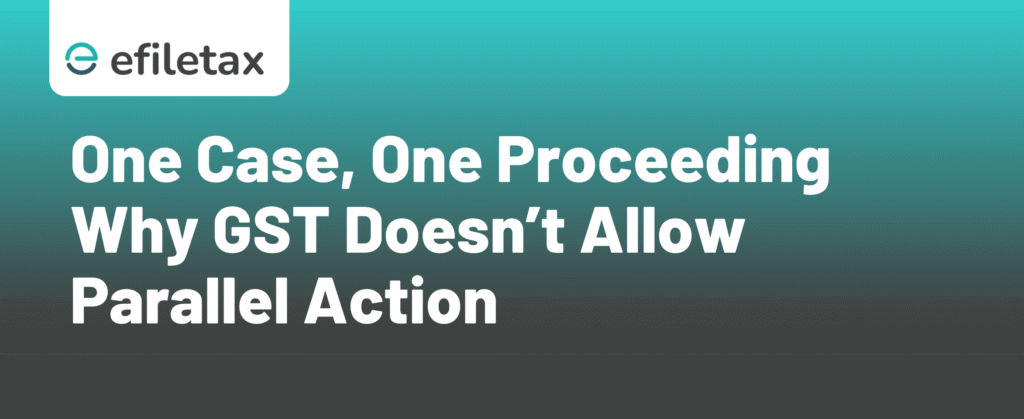
Parallel Proceedings Are Not Permissible in the GST Regime
The concept of parallel proceedings in GST has become a critical topic as taxpayers face inquiries from multiple wings—like DGGI and State GST—at the same time. However, courts across India have made it clear: parallel proceedings are not permissible in GST unless exceptional circumstances exist.
Let’s break this down in simple terms.
What Are Parallel Proceedings Under GST?
Parallel proceedings refer to simultaneous investigations, audits, or assessments by different GST authorities—often for the same issue or time period. For instance:
- DGGI initiates a summons under Section 70
- At the same time, State GST sends a notice under Section 61 or 65
- Both ask for the same data or examine the same transaction
This leads to duplicity, taxpayer harassment, and a waste of administrative resources.
Legal Stand: Courts Disapprove Parallel Proceedings
Here’s what the judiciary says:
| Court | Case Name | Key Finding |
|---|---|---|
| Delhi HC | P.P. Impex v. UOI, 2022 | No simultaneous action by CGST and SGST for same matter |
| Telangana HC | Megha Engineering v. DGGI, 2023 | DGGI can’t act if SGST already initiated proceedings |
| Madras HC | M/s Furasys v. DGGI, 2024 | Allowed only if new material evidence arises |
Legal Reference: Article 265 of the Constitution and Section 6 of CGST Act (cross-empowerment clause) support the principle of one tax, one investigation.
Why Parallel Proceedings Are Disallowed in GST
- Violation of Natural Justice: Facing two authorities for the same issue is unfair.
- Section 6(2)(b) of CGST Act, 2017: If proceedings are initiated by one authority, others must stay away.
- Doctrine of Proportionality: Investigations must not be excessive or oppressive.
- Efficiency: Prevents duplication of work and preserves administrative bandwidth.
Expert View: Know Your Rights Before Replying to Multiple Notices
Tip from CA S. Mehra: “If you receive notices from both State and Central GST for the same issue, respond to only one and raise an objection citing Section 6(2)(b) of CGST Act. You can attach relevant High Court judgments in your reply.”
Practical Steps for Taxpayers
Here’s what you should do if caught in parallel proceedings:
- Identify the subject matter of both notices
- Check if the issue is identical in both
- Respond to the first-issuing authority only
- Cite Section 6(2)(b) of CGST Act in your reply
- Attach copies of relevant case laws (see above)
- Escalate to High Court if harassment continues
Subheading With Keyphrase:
How Courts Handle Parallel Proceedings in GST Cases
- Delhi HC: Stayed second proceedings if CGST had already acted
- Madras HC: Recognised the burden on taxpayers and disallowed DGGI overlap
- Telangana HC: Upheld the principle that one authority must conclude first
This strengthens the idea that parallel proceedings in GST are not legally tenable unless backed by strong, new evidence.
Frequently Asked Questions (FAQs)
Q1. Can DGGI and SGST conduct raids together?
Yes, but only through a joint investigation. If one starts, the other should not initiate separately.
Q2. What if both departments summon you?
Reply to the authority that initiated the investigation first and inform the other accordingly.
Q3. Is there a section in CGST Act that supports this?
Yes. Section 6(2)(b) ensures that if one authority initiates, others cannot proceed on the same matter.
Summary
Courts have held that parallel proceedings in GST—simultaneous action by CGST and SGST—are not permissible. Taxpayers should cite Section 6(2)(b) and recent HC rulings to defend against dual harassment.
Final Thoughts
In the GST regime, one tax means one investigation. If you’re facing dual inquiries for the same matter, you have legal backing to challenge it.